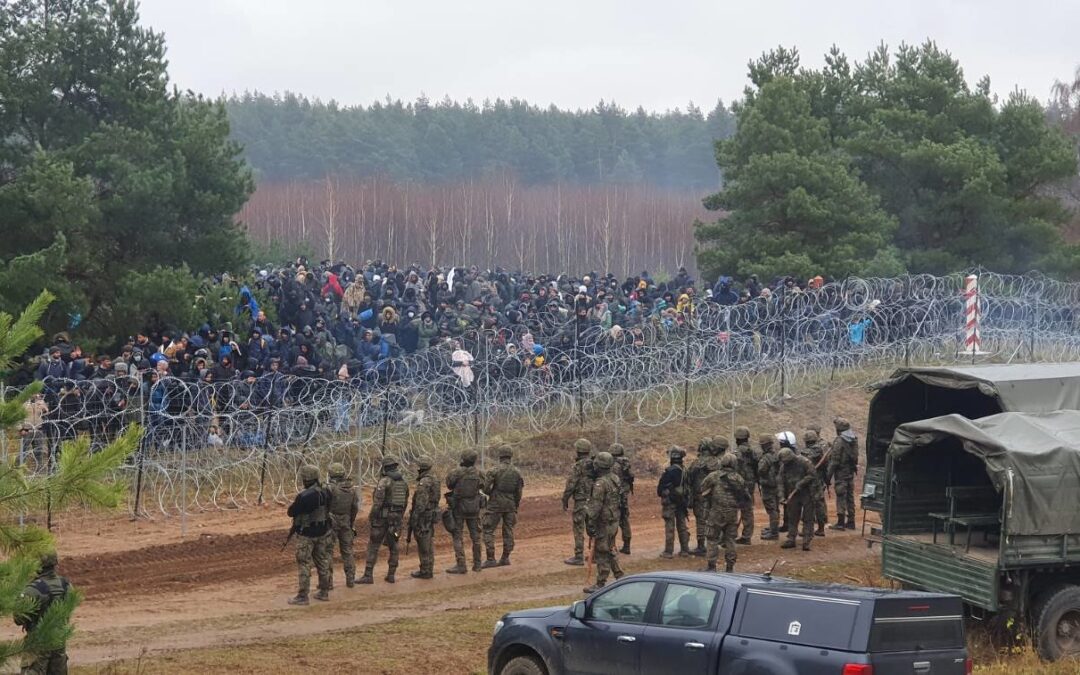The president of the European Council, Charles Michel, visited Warsaw today to express support for Poland as it faces a growing surge of people seeking to force their way across the border from Belarus in what he called a “brutal hybrid attack” against the European Union.
Michel met with Poland’s prime minister, Mateusz Morawiecki, who described Belarus’s actions as “state terrorism”. The two discussed how to respond to the crisis, including the possibility of imposing new sanctions on Minsk and EU financing for border infrastructure.
Full EU solidarity with #Poland and @MorawieckiM facing hybrid attack from #Belarus.
The only European answer is firmness, unity and the promotion of our fundamental values.
The images of an authoritarian regime pushing families at the border of #Belarus are unacceptable. pic.twitter.com/3vNPxTCoUN
— Charles Michel (@eucopresident) November 10, 2021
“I came to Poland today to express the solidarity of the whole EU with Poland as it faces a serious crisis,” said Michel after meeting with Morawiecki. “As we face this hybrid, brutal, violent and shameful attack, the only answer is firmness and unity, but also the promotion of our fundamental values.”
The council president accused Belarus’s “authoritarian regime [of] displaying the most abject cynicism by pushing families, women and children into a situation which is shameful and unacceptable”.
This year, tens of thousands of people – mainly from the Middle East, Asia and Africa – have attempted to enter Poland, Lithuania and Latvia from Belarus, whose authorities facilitate their travel to Minsk and then help them reach and try to cross the EU’s borders.
“This is a serious situation; that is why we have to act fast and seriously,” said Michel. Among the responses discussed with the Polish premier were new sanctions against Belarus, taking action in the migrants’ countries of origin to prevent their departure, and “financing physical infrastructure that would protect the EU better”.
Poland recently launched work on a new wall along the border that it says will create an “impenetrable” barrier. The 1.6 billion zloty (€348 million) estimated cost is set to be paid by Poland itself, without any EU contribution.
Speaking alongside Michel, Morawiecki thanked him for the visit, noting that it comes amid “new methods of provocation by” Belarus that have been “a test for Poland and the EU in recent days”.
On Monday, thousands of migrants gathered at one point on the Belarusian side of the border, with some unsuccessfully attempting to force their way through. They subsequently set up camp there, while the following days have seen other breaches of the border by large groups of migrants.
These “events may look like a migration crisis, but they are not”, said the Polish prime minister. “It is a political crisis caused for the purpose of destabilising the EU…This is a manifestation of state terrorism and revenge by Lukashenko for the fact that we were supporting democratic elections.”
Morawiecki called on EU leaders to “act together to work out a common response”. This should include blocking flights from the Middle East to Belarus, diplomatic measures by the EU in Middle Eastern capitals, and strengthened sanctions, he said.
"The Poles have reacted correctly; they are doing a very important service for the whole of Europe," says Germany's interior minister amid a surge in attempted crossings from Belarus
He accused Russia of supporting Belarus's "hybrid threat" against the EU https://t.co/xzQa7yTS57
— Notes from Poland 🇵🇱 (@notesfrompoland) November 9, 2021
The Polish prime minister was also asked about his country’s imposition of a state of emergency on the border, and in particular the fact that it bans the media from visiting and reporting from the area.
Morawiecki argued that the measures are necessary because, before they were introduced, various people were coming to the border to “create a spectacle in front of the cameras” and “the presence of media intensifies provocation”.
That was likely a reference to activists and opposition politicians who came to try to give aid to border crossers, and in one case to pull down the border fence. The prime minister also warned that the current situation at the border could “pose a direct threat to journalists or other people who want to be on the front line”.
Amid the recent escalation of the crisis at the border, Poland has received expressions of support from a number of allies, including Germany, the European Commission, and NATO. There has also been widespread condemnation of Belarus’s actions, including by the US State Department.
Today, Donald Tusk, the leader of Poland’s largest opposition party, sent an appeal to EU leaders calling on them to show “full solidarity with Poland in the face of the growing crisis on the border…irrespective of your views regarding migration and the internal situation in Poland”.
“The fundamental safety and security of our community are at stake,” warned Tusk. “Lack of reaction or postponing will only embolden provocateurs and their protectors.”
An open letter to European Leaders. pic.twitter.com/RcKrYWMjdA
— Donald Tusk (@donaldtuskEPP) November 10, 2021
Main image credit: 16 Dywizja Zmechanizowana/Kancelaria Premiera (under CC BY-NC-ND 2.0)

Daniel Tilles is editor-in-chief of Notes from Poland. He has written on Polish affairs for a wide range of publications, including Foreign Policy, POLITICO Europe, EUobserver and Dziennik Gazeta Prawna.




















